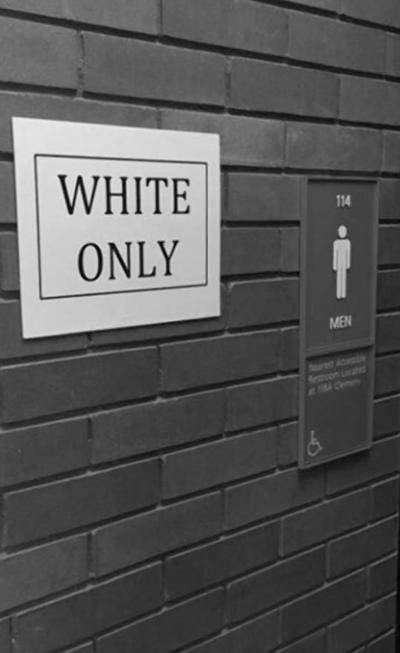Powell and her artwork take center stage at Burchfield
“WHITE ONLY” signs, such as the one shown above, were placed all over University at Buffalo’s campus started a lot of discussion about racism.
April 6, 2016
Half a year ago, Ashley Powell unveiled her artwork, a host of “White Only” and “Black Only” signs hung around the campus of the University at Buffalo. The shockwave spread outward, garnering international comment and dissent. Now Powell will be discussing her work, called “Our Compliance,” with a panel of three other speakers and a moderator at the Burchfield Penney Art Center on April 8, 2016 at 7 p.m.
In a letter to The Spectrum in September 2015, Powell claimed that she was in pain, haunted by self-hate and trauma due to institutionalized racism. And she continues to feel that pain.
“(Since the project) all the hate mail, and all of the comments on the Internet and social media only confirmed all the motivations for the project,” Powell said.
Some of those comments said that racism no longer existed in America. To those people, Powell only said, “They’re delusional.”
One of the panelists, Ron Stewart, a professor in the Sociology Department of SUNY Buffalo State, commented on what to expect.
“We’re going to talk about the exhibit and we’re going to pose questions to the audience about what Ms. Powell had in mind having to do with white privilege and stuff like that,” Stewart said. “I think it hearkens back to the Civil Rights Movement when one solitary act of Rosa Parks, in a sense, generated a whole movement. So there are things we can do as individuals, as students, that can be a catalyst for ameliorating some of the inequities, particularly racial inequities, that
we have in our society that for some reason, in this current political climate have been brought back to the surface again.”
Moderating the event will be Gary L. Wolfe, an artist who also worked in the local government providing health services for those in need. Wolfe’s work includes paintings of the homeless and the elderly and often combine Christian-Judeo images with images that challenge the viewer. However, he has never been at the center of a wild-storm of criticism that Powell has endured.
“There are a lot of reasons why it caused such a stir, but I think the cultural tension that occurred in reflection of the culture that we’re living in, and what we tend to value and what we tend to fear and how we tend to see what is appropriate and not appropriate (came up),” Wolfe said. “And as Ms. Powell’s title of her work, how compliant we feel we need to be.
“I haven’t heard any blowback like Ms. Powell has. No, I haven’t. She really stirred the pot, and that’s a good thing.”
Other panelists include Millie Chen, an art professor at UB, and John Jennings, an associate professor who works with graphic design.
email: [email protected]




